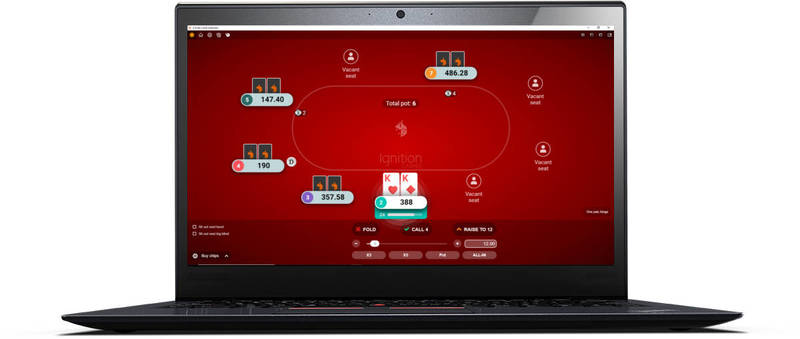Continuation Betting Tips
Cbetting Articles: The Continuation Bet : More Cbetting Tips : When To CBet (Examples) : Double Barrelling

Still need some help with your cbetting game? Don't worry, you'll get there eventually with practice.
In the meantime, here are a handful of tips to help you develop a well-rounded continuation bet strategy.
1) Rule of thumb: Wet is bad, dry is good.
When making a continuation bet bluff when you haven’t connected with the flop, as a very general rule of thumb, dry flops are better for continuation betting than wet ones.
As a quick reminder, dry flops are uncoordinated whereas wet flops are highly coordinated with potential for a lot of drawing hands. See the continuation betting examples for a more in-depth discussion.
This rule isn’t going to apply to every flop imaginable, but it’s a good place to start if you come up against an unfamiliar flop and have no idea whether or not a continuation bet would be appropriate.
2) You can bet slightly less on dry flops.
On very dry flops, it may well be the case that a 2/3 or even ½ pot size bet will do the exact same job a ¾ pot size bet will.
For example, let’s say you hold AQ on a K72 flop and you decide to make a cbet. On this sort of flop your opponent is unlikely to continue with their hand unless they have a K, 7 or decent pocket pair. There are no draw possibilities, so your opponent will just as happily fold to a $5 bet in to a $10 pot as they would to an $8 bet in to a $10 pot.
Conversely, let’s say you hold AK on a flop of Q87. A lot more hands like 56, 9T, 96 and 9J will be more inclined to call a ½ pot size bet as opposed to a ¾ pot size bet. Therefore a $5 bet in to a $10 pot will be less effective than a slightly larger $8 bet in to a $10 pot. It’s a small difference, but it definitely has an effect.
It’s better to bet a slightly smaller amount if you are confident that it will have the same effect as a larger bet due to the fact that you are risking less money for the same outcome. Don’t go out of your way to bet minimally at every opportunity, but just be aware of the option in certain situations.
3) It’s nice to have some equity when cbet bluffing, but it’s not essential.
As with any bluff the more equity we have the better. This basically means that when cbet bluffing it’s better to hold a hand that could still potentially win the pot if we get called on the flop.
For example, it’s better to have A![]() Q
Q![]() on a flop of K
on a flop of K![]() 7
7![]() 2
2![]() than it is to have K
than it is to have K![]() Q
Q![]() on a flop of A
on a flop of A![]() 7
7![]() 2
2![]() .
.
This is because with the A![]() Q
Q![]() hand we have an overcard that can give us a higher pair on the turn or river if called, whereas if our opponent already has top pair on a flop of A
hand we have an overcard that can give us a higher pair on the turn or river if called, whereas if our opponent already has top pair on a flop of A![]() 7
7![]() 2
2![]() there is very little a hand like K
there is very little a hand like K![]() Q
Q![]() can do to improve.
can do to improve.
In spite of this, whilst it’s nice to have equity it’s not essential for making cbet bluffs. There will be a lot of times where you can make a cbet bluff with very little equity and it will still be +EV. Nonetheless, there's no denying it makes you feel warmer inside to have at least some equity just in case though.
4) The reason we cbet so much is for balance.
Many winning players will tell you that they will cbet almost every flop they see. So when you are advised to cbet around 70% of flops you are doing this for balance.
See the article on balancing your range for more information. It's an interesting read.
If you cbet this frequently you cannot expect to make your opponent fold every time you miss and have them call every time you hit it just doesn’t work like that. However, because you are betting with almost your entire range of hands when you see the flop it makes it near-impossible for your opponent to know what you hold when you cbet.
Therefore, this lack of information for your opponent allows them to make more mistakes than if we were to cbet 90% of the time when we hit and 20% of the time when we miss. If we cbet almost all of our hands our cbetting is balanced and we stand to make a profit from this.
In a nutshell, cbetting such a large % of our hands makes us difficult to read and makes us money over the long run.
5) Don’t be put off when your opponent calls a cbet bluff.
Following on from the last point, do not get disheartened when you opponent ends up calling one of your cbet bluffs. If we are cbetting such a high percentage of the time we should expect to occasionally get looked up when we do not want to.
Far too many players have one negative experience from a certain play and convince themselves that it’s not profitable to continue making that play. However, with cbetting you have to put your faith in the less-than-obvious fact that you are actually making more money over the long run, even if you expect to lose a little in some hands from time to time. It's the same principle as the one used in pot odds.
We stand to win more money from the times our opponent makes an incorrect call or fold than we expect to lose from the times our opponent makes a correct call due to the fact that we are cbetting so much - try reading that over again until it sinks in. It’s hard to grasp at first but you’ll get there.
Furthermore, just because we get called it doesn’t mean that it’s end of sports. We may well still have an opportunity to win the hand through potentially firing a second barrel or actually improving on the turn or river.
Things get easier when you understand why you are cbetting and already have a plan of action for when/if your cbet gets called.
Go back to the awesome Texas Hold'em Strategy.
Comments

